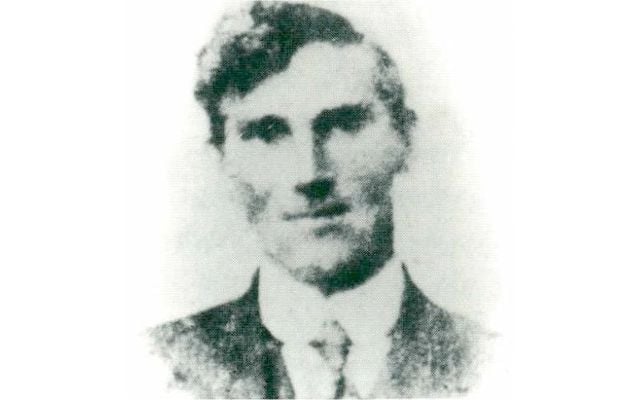A well-respected emigrant, this Limerick man had lived in Chicago for nine years and was returning to the US when tragedy struck on April 15, 1912.
On April 15, 1912, the Belfast-built RMS Titanic sank, after colliding with an iceberg, killing over 1,500 passengers and crew on board. This was one of the deadliest commercial, peacetime maritime disasters in modern history and among those on board were many Irish.
In the run-up to the anniversary of the disaster, IrishCentral will take a look at the Irish on board – the lucky, unlucky and heroic.
This is an extract from the book “The Irish Aboard the Titanic” by Senan Molony, which tells the tales of the people who were on board the night the ship went down. This book gives those people a voice. In it are stories of agony, luck, self-sacrifice, dramatic escapes, and heroes left behind.
Patrick Dooley
Ticket number: 370376. Paid £7 15s.
Boarded at: Queenstown. Third Class.
From: Patrickswell, Knockainey, Lough Gur, County Limerick.
Destination: 142 East 31st Street, New York city, for onward to Chicago.
A postcard, written by Patrick Dooley (38) from Queenstown, declared:
‘I am sailing today, Thursday, on Titanic on her maiden trip to New York, her first trip on the Atlantic. Goodbye. Love, Patrick Dooley’. The postcard showed a man standing in a roadway, cap in hand.
Titled ‘The Irish Emigrant’, a poem beneath ran:
I’m bidding you a long farewell, my Mary kind and true, But I’ll not forget you Darling, in the land I’m going to; They say there’s bread and work for all, and the sun shines always there, But I’ll never forget Ould Ireland were it fifty times as fair, were it fifty times as fair.
Patrick J. Dooley, by all accounts, was an extremely generous and considerate man.
Much regret was felt by the people of Bruff and Loughguir districts when it was learned that Mr Patrick Dooley, son of Mr Edmond Dooley of Patrickswell, was amongst the number who went down with that ill-fated vessel.
Mr Dooley was home on holidays from Chicago, chiefly for the purposes of seeing his aged father, and left in good spirits.
"He was a fine type of our exiled countrymen and on several occasions won distinction in American athletics. Mr Dooley was also one of the truest Irishmen that ever emigrated to the Great Republic of the West and never kept his purse closed when the cause of Ireland needed it."
(The Cork Examiner, 16 May 1912)
Dooley had been living in Chicago for nine years, having emigrated in early 1903, and worked in a hotel. He was on the verge of coming home for good and was only traveling back to the United States for a short time.
A letter found in his estate administration papers suggests this strongly, and was written by a solicitor acting for Dooley’s elderly father, who is presumably the source of the lawyer’s information:
1st July, 1913.
Dear Mr Travers,
I enclose papers for Grant of Administration intestate herein. The deceased was drowned on the Titanic and the only property he left was a deposit receipt in the Munster & Leinster Bank for £104 deposited a few days before he sailed out. He may have taken some little money with him, but he was not to remain long over. Have I the place of death described correctly? If not, please return to be amended.
Yours faithfully,
Roger Fox.
The described place of death was ‘in mid-ocean, being a passenger on board the Titanic.’ The single slip of paper lying behind in some safe place at home, signifying a hoard at the bank branch in Bruff, is a poignant image, somehow conveying again Patrick Dooley’s detachment from money as an end in itself. His father, Edmond, who was illiterate, declared in the application to inherit the money left behind that his son was a 38-year-old bachelor, a laborer, who left only his father and one brother surviving in Ireland.
A number of the family had emigrated from the tiny hamlet of Patrickswell, not to be confused with a town of this name in the same county.
The American Red Cross nonetheless had to step in to assist other relatives left in the lurch by the loss of Mr. Dooley. The details vary in this description, but there is little doubt that he is the person concerned since that organization alphabetized its caseload:
Report of the American Red Cross (Titanic Disaster) 1913:
No. 87. (Irish.) A motorman, 34 years old, was drowned while returning from a visit to his parents in Ireland. A widowed sister and four children were dependent upon him for support, and his brother and wife and two children had also been helped by him.
The appropriation made will be administered by the local charity organization Society for the benefit of the dependent sister and her family. ($468)
The occupation described here is likely to be most accurate, whereas ‘laborer’ was almost a generic term for ‘Irishman’ when it came to filling out legal papers. As regards age differentials, Patrick Dooley claimed to be 32 when signing aboard the Titanic, while posthumous legal papers put him six years older.
What is known is that Pat Dooley had planned to stay with his brother Richard (37) at East 31st Street, New York. They had only met once during Pat’s near-decade in the USA. Their widowed father, Edmond, still farming, was into his seventies by 1912. It may have been intended that Pat would take over running the farm.
Patrick also had a sister Mary (41), and brothers Michael (39) and John (33). Many of these lives would not have been so damaged had the Cymric sailed as scheduled, four days before the Titanic, on Easter Sunday, 7 April.
“The Irish Aboard the Titanic” by Senan Molony is available online.
* Originally published in 2012, updated in April 2024.




Comments